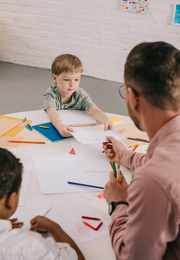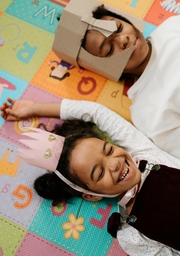Drop-In Daycare: A Guide for Busy Parents
While regular day cares work wonders for busy parents, drop-in-daycares work as a perfect solution with ones looking for a flexible solution. It is very different from a conventional day care center as parents do not have to commit to the services on a long-term basis and use them on an as need basis.
Let’s dive deeper and help you understand this very refreshing concept that can be a game changer for you and your child.
What Is Drop-In Daycare?
Drop-in daycare is a service that is there for you when your initial childcare plans fall through. For example, you may have a regular babysitter who called in sick. Or your regular daycare has an emergency situation, such as a water leak or needs to close temporarily due to an outbreak of the flu with the staff.
You can also think of drop-in daycare as a supremely helpful friend who can look out for your kids whenever you have to step out of your home on short notice. It may be date nights, meetings, or anything else you can think of. The only difference is that you will have to pay for your daycare, which I am assuming you don’t do with friends.
Why It’s Great for Parents
As parents, we love some flexibility. You don’t have to book a daycare weeks in advance, if not months. You can use their services when you need them. It makes it ideal for parents who do not have a specific schedule, are entrepreneurs, or work in fields that have impromptu scheduling issues. Or you may just need some alone time in the care while running errands.
What to Expect
Drop-in daycare centers come with a wide range of child-friendly activities to keep your little ones busy and entertained. Activities can involve arts and crafts, storytime and physical play. Most daycares also take care of the meals and snacks that children require throughout the day.
Check for Cleanliness
Parents should observe several key areas during their visit. Look for regular cleaning schedules posted, particularly for high-touch areas like toys, tables, and door handles. Keeping a childcare center clean and sanitized reduces the transmission of harmful germs. Pay attention to linens, bedding, and shared spaces. Cleanliness protocols for sick children and isolation procedures should be clear.
Finding the Right Place
Please note that every single daycare won’t offer drop-in services. Do a bit of research on which ones offer this service in your area. Look for reviews online. Make sure to visit them in person. Always make sure that they are following safety guidelines and are licensed. Ask other parents for reviews and their experiences. Always prioritize your child’s comfort and safety over everything else.
Tips for Parents
- Plan Ahead: Even drop-in daycares require some level of planning. So, plan out your schedule as best as you can.
- Pack Essentials: Make sure to pack all the essentials such as an extra pair of clothes, socks, formula, any snacks that they love, their favorite toy or anything that your child cannot go without.
- Goodbye Routine: Keep the goodbyes short and sweet to keep it easy on you and your kid.
- Stay Connected: Ask the staff to send you pictures and videos of your kid from time to time. Stay connected with the caregivers about how your child is adjusting to the new routine.
Ask for Additional Information
Ultimately, the drop-in daycare you choose for your child will have additional requirements or advice on what they need to best care for your child. Be sure to ask them about what their preparedness for child safety, including hygiene. they may need to best care for your child. Remember, these are not your daily care providers. Your child may rarely only visit this center or periodically.
Once you have established a relationship with your new childcare providers, you can rest easy that your child is in good hands. Just as vital, your child will feel welcomed and comfortable throughout the transition to a new place. A place they will be excited to visit whenever you need.
Conclusion
Drop-in daycare is a fantastic option for parents who need childcare that fits into their unpredictable schedules. It saves you time, money, and a lot of hassle. As implied earlier, not all drop-in daycares are created equal. Don’t skimp out on doing proper research. It’s tempting because as a parent, you’re busy.
The time you take now for proper due diligence to find the best drop-in day care will pay off big time for you and your child.











